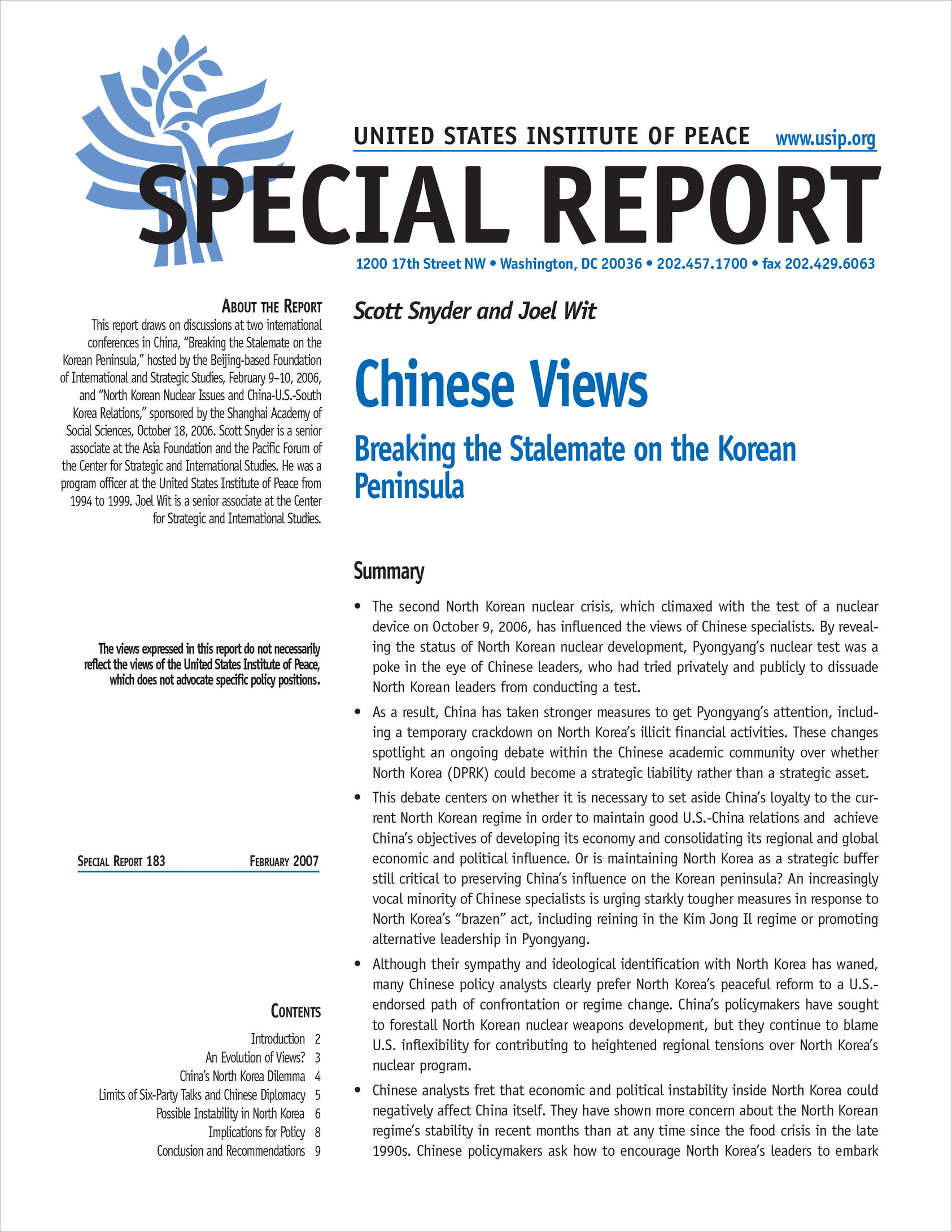Chinese Views: Breaking the Stalemate on the Korean Peninsula
Drawing on two international conferences recently held in China, this report explores the influences relationships such as that between the U.S. and China have on the Korean peninsula.

Summary
- The second North Korean nuclear crisis, which climaxed with the test of a nuclear device on October 9, 2006, has influenced the views of Chinese specialists. By revealing the status of North Korean nuclear development, Pyongyang's nuclear test was a poke in the eye of Chinese leaders, who had tried privately and publicly to dissuade North Korean leaders from conducting a test.
- As a result, China has taken stronger measures to get Pyongyang's attention, including a temporary crackdown on North Korea's illicit financial activities. These changes spotlight an ongoing debate within the Chinese academic community over whether North Korea (DPRK) could become a strategic liability rather than a strategic asset.
- This debate centers on whether it is necessary to set aside China's loyalty to the current North Korean regime in order to maintain good U.S.-China relations and achieve China's objectives of developing its economy and consolidating its regional and global economic and political influence. Or is maintaining North Korea as a strategic buffer still critical to preserving China's influence on the Korean peninsula? An increasingly vocal minority of Chinese specialists is urging starkly tougher measures in response to North Korea's "brazen" act, including reining in the Kim Jong Il regime or promoting alternative leadership in Pyongyang.
- Although their sympathy and ideological identification with North Korea has waned, many Chinese policy analysts clearly prefer North Korea's peaceful reform to a U.S.-endorsed path of confrontation or regime change. China's policymakers have sought to forestall North Korean nuclear weapons development, but they continue to blame U.S. inflexibility for contributing to heightened regional tensions over North Korea's nuclear program.
- Chinese analysts fret that economic and political instability inside North Korea could negatively affect China itself. They have shown more concern about the North Korean regime's stability in recent months than at any time since the food crisis in the late 1990s. Chinese policymakers ask how to encourage North Korea's leaders to embark on economic reform without increasing political instability. Discussions with Chinese experts reveal considerable uncertainty about the future of North Korean reform.
- The possibilities of military confrontation on the Korean peninsula, involving the United States and either a violent regime change or destabilization through North Korea's failure to maintain political control, are equally threatening to China's fundamental objective of promoting regional stability. These prospects have increased following North Korea's nuclear test and the strong reaction from the international community, as shown by UN Security Council Resolution 1718.
- China's economic rise has given it new financial tools for promoting stability of weak states on its periphery. Expanded financial capacity to provide aid or new investment in North Korea might help it achieve political and economic stabilization. The Chinese might prefer to use the resumption of benefits temporarily withheld as a way of enhancing their leverage by reminding the North of its dependence on Beijing's largesse.
- Managing the ongoing six-party talks will pose an increasingly difficult diplomatic challenge for China. Chinese diplomats take credit for mediation and shuttle diplomacy, but their accomplishments thus far have been modest. Talks have been fairly useful in stabilizing the situation, but they have also revealed the limits of China's diplomatic influence on both the United States and North Korea. U.S. intransigence is as much an object of frustration to the Chinese as North Korean stubbornness.
- Chinese analysts clearly have given thought to potential consequences of regime instability. For example, the Chinese military 's contingency plans for preventing the spillover of chaos into China and for seizing loose nukes and fissile material imply that Chinese forces would move into North Korean territory.
- Without effective coordination, simultaneous interventions in the event of unforeseen crisis inside North Korea could lead to direct military conflict among U.S., Chinese, and South Korean military forces. Rather than accept South Korean intervention backed by the United States as a prelude to reunification, Chinese analysts repeatedly emphasize that "the will of the North Korean people must be considered" in the event of instability. If intervention were necessary, China clearly would prefer insertion of an international peacekeeping force under UN auspices. Such a force would establish a representative government, which would then decide whether to negotiate reunification with South Korea.
About the Report
This report draws on discussions at two international conferences in China, "Breaking the Stalemate on the Korean Peninsula," hosted by the Beijing-based Foundation of International and Strategic Studies, February 9-10, 2006, and "North Korean Nuclear Issues and China-U.S.-South Korea Relations," sponsored by the Shanghai Academy of Social Sciences, October 18, 2006.
Scott Snyder is a senior associate at the Asia Foundation and the Pacific Forum of the Center for Strategic and International Studies. He was a program officer at the United States Institute of Peace from 1994 to 1999. Joel Wit is a senior associate at the Center for Strategic and International Studies.


